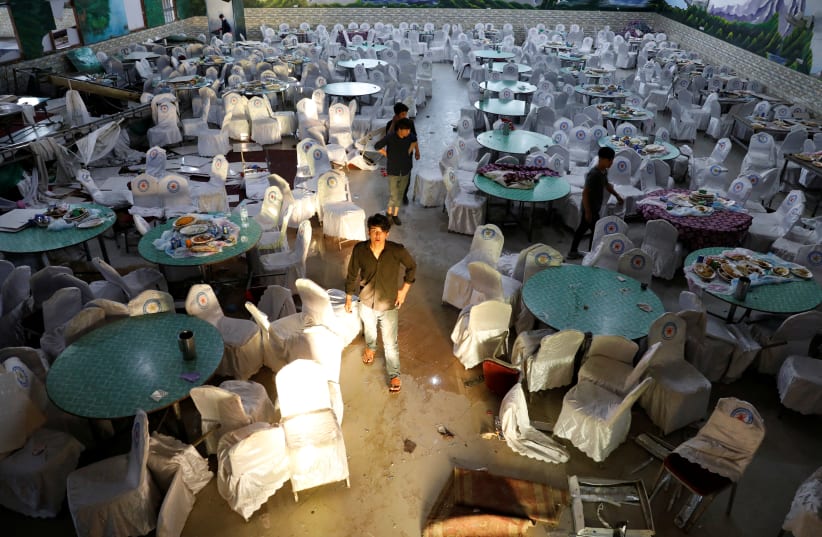KABUL - The Islamic State (IS) militant group claimed responsibility on Sunday for a suicide blast at a wedding reception in Afghanistan that killed 63 people, underlining the dangers the country faces even if the Taliban agrees a pact with the United States.
The Saturday night attack came as the Taliban and the United States try to negotiate an agreement on the withdrawal of U.S. forces in exchange for a Taliban commitment on security and peace talks with Afghanistan's U.S.-backed government.
Islamic State fighters, who first appeared in Afghanistan in 2014 and have since made inroads in the east and north, are not involved in the talks. They are battling government and U.S.-led international forces and the Taliban.
The group, in a statement on the messaging website Telegram, claimed responsibility for the attack at a west Kabul wedding hall in a minority Shi'ite neighborhood, saying its bomber had been able to infiltrate the reception and detonate his explosives in the crowd of "infidels."
IS has claimed some of the most bloody attacks in Afghan cities over the past couple of years, with some aimed at the Shi'ite minority.
The Taliban had earlier denied responsibility for the Kabul attack and condemned it.
More than 180 people were wounded, with many women and children among the casualties, interior ministry spokesman Nasrat Rahimi said on Sunday as families thronged to Kabul's crowded cemeteries.
"We want peace, not such brutal suicide attacks," said Ahmad Khan, who was burying a relative.
Pictures on social media from the scene of the blast showed bodies strewn amid overturned tables and chairs, with dark blood stains on the wedding hall carpet.
Both the bride and groom survived.
"I won't ever be able to forget this, however much I try," the groom, Mirwais Elmi, told the TOLOnews channel.
He said his cousin and some friends had been killed.
"I can't go to the funerals, I feel very weak ... I know that this won't be the last suffering for Afghans; the suffering will continue."
The bride’s father told TOLOnews that 14 members of his family were killed.
BLOODSHED AND TALKS
Wedding halls have become big business in Kabul as the Afghan economy slowly picks up and families spend more on celebrations. The big, brightly lit halls that line some suburban streets of the city have been targeted previously by bolmbers.
At least 40 people were killed in a blast at a Kabul wedding hall in November.
There has been no let-up in fighting and bomb attacks in Afghanistan over recent months despite talks between the United States and the Taliban since late last year.
In the northern province of Balkh, 11 civilians were killed on Sunday when a roadside bomb blew up their van, police said.
President Ashraf Ghani, in comments on the Kabul blast before the IS claim, said the Taliban could not "absolve themselves of blame for they provide a platform for terrorists."
Celebrations for Monday's 100th anniversary of Afghanistan's independence from Britain were curtailed out of respect for the blast victims, the president's office said.
The Taliban has been fighting to expel foreign forces and re-establish an Islamic state since its ousting in October 2001, weeks after the Sept. 11 attacks on the United States.
Both U.S. negotiators and the Taliban have reported progress after eight rounds of talks since late last year. But some Afghans were skeptical about the effort, amid the carnage.
U.S. President Donald Trump has made no secret of his desire for a U.S. pullout from Afghanistan and an end to America's longest war.
But there are concerns among Afghan officials and U.S. national security aides that Afghanistan could be plunged into a new civil war that could herald a return of Taliban rule and international militants, including IS, finding a refuge.
Afghan officials also fear a Taliban pact could drive some die-hard fighters into the arms of IS.
Some U.S. officials want to maintain a counter-terrorism capability in Afghanistan if a withdrawal pact is struck, but the Taliban says it wants all foreign to leave.Some 14,000 U.S. troops remain in Afghanistan, training and advising Afghan security forces and conducting counterinsurgency operations.
